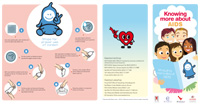Pamphlet
Knowing more about AIDS
Download PDF file of the pamphlet for printing
French │Hindi │Indonesian │Nepali │Simplified Chinese │Tagalog │ Thai │Traditional Chinese │Urdu│Vietnamese│Sinhala│Bengali
|
 What is AIDS? AIDS stands for Acquired Immunodeficiency Syndrome. AIDS is caused by the Human Immunodeficiency Virus (HIV). HIV attacks and destroys CD4 cells, the disease-fighting cells of the immune system. As the immune system is seriously damaged, the infected person is more vulnerable to certain cancers and a wide range of infections. These types of infections are known as opportunistic infections because they take advantage of a person’s weakened immune system. How is HIV passed from one person to another? HIV is primarily found in the blood, semen, or vaginal fluid of an infected person. These are the most common ways that HIV is transmitted from one person to another:
Can I get HIV from casual contact? HIV is not transmitted by day-to-day activities such as shaking hands and hugging. You cannot become infected through a kiss on the cheek, sharing meals, or sitting on toilet seats. Besides, there is no evidence to show that mosquitoes can transmit HIV. How can I know if someone has HIV? Most people with HIV do not appear sick, it is impossible to tell if a person has the virus just by looking at, or talking to, him or her. A person has HIV can pass the virus to others even if no symptoms are present. The only way to know if someone has HIV is by an HIV antibody test. What is HIV antibody test? Antibodies are made in your blood when your body is exposed to an infection. Antibodies are one of the body’s tools for fighting infections. The antibodies against HIV, however, are not protective in nature. HIV antibody testing is a blood test carried out to find out if you have contracted HIV. If HIV antibodies are present, the test is positive. It means that the person is HIV-infected. If you receive a negative result after the window period, it means that you have not been exposed to the infection. What is the Window Period? A window period is the time between initial infection with HIV and a positive test result occurs. The window period for HIV testing is 3 months. During the window period, the infected person can transmit the virus even though an HIV antibody test shows a negative result. Is there a cure for AIDS? At this time, there is no cure for AIDS, but medications are effective in fighting HIV and its complications. A number of drugs are available to prevent or treat the opportunistic infections and illnesses associated with advanced HIV disease. The use of antiretroviral therapy can effectively control HIV, and slow down the rate at which HIV weakens the immune system. HIV treatment is helping HIV-positive people to stay healthier longer. As with other diseases, early detection offers more options for treatment and preventive care. Should I get tested? You should consider getting tested if you or your sexual partner have ever had unprotected sex, sexually transmitted infections, and/or shared needles or syringes to inject drugs. Please call the AIDS Hotline at 2780 2211 for free and anonymous HIV antibody testing services. How can I protect myself from HIV infection?
Steps for proper use of condom
Related Hotlines
Related Websites
Produced by Red Ribbon Centre – UNAIDS Collaborating Centre for Technical Support, Hong Kong
|